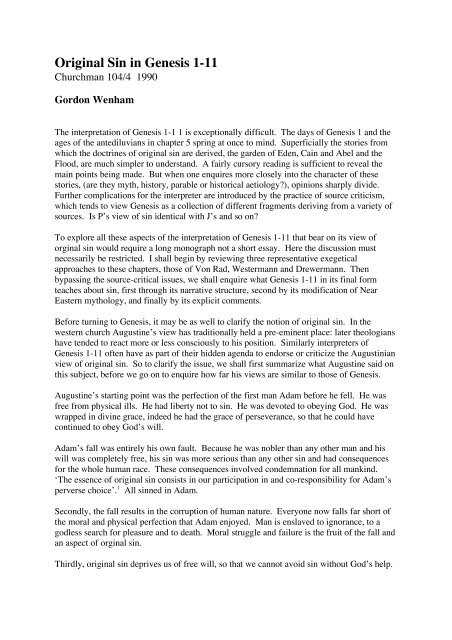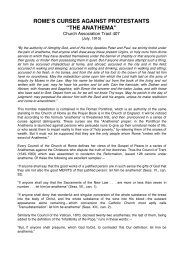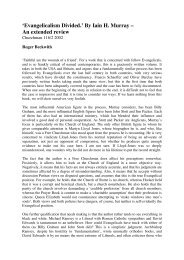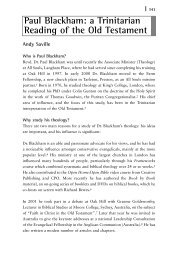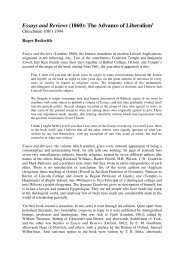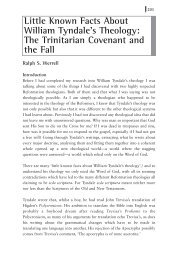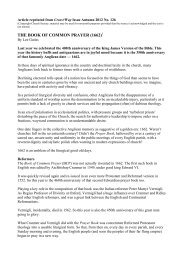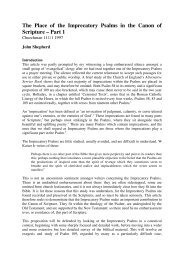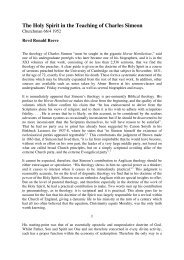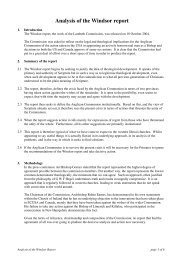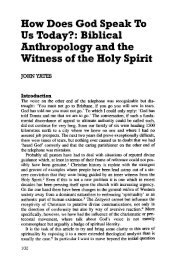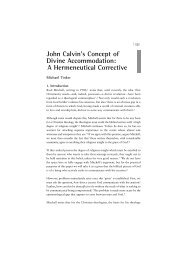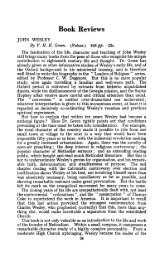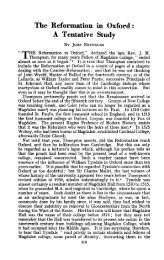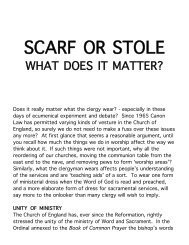Original Sin in Genesis 1-11 - Church Society
Original Sin in Genesis 1-11 - Church Society
Original Sin in Genesis 1-11 - Church Society
Create successful ePaper yourself
Turn your PDF publications into a flip-book with our unique Google optimized e-Paper software.
<strong>Orig<strong>in</strong>al</strong> <strong>S<strong>in</strong></strong> <strong>in</strong> <strong>Genesis</strong> 1-<strong>11</strong><strong>Church</strong>man 104/4 1990Gordon WenhamThe <strong>in</strong>terpretation of <strong>Genesis</strong> 1-1 1 is exceptionally difficult. The days of <strong>Genesis</strong> 1 and theages of the antediluvians <strong>in</strong> chapter 5 spr<strong>in</strong>g at once to m<strong>in</strong>d. Superficially the stories fromwhich the doctr<strong>in</strong>es of orig<strong>in</strong>al s<strong>in</strong> are derived, the garden of Eden, Ca<strong>in</strong> and Abel and theFlood, are much simpler to understand. A fairly cursory read<strong>in</strong>g is sufficient to reveal thema<strong>in</strong> po<strong>in</strong>ts be<strong>in</strong>g made. But when one enquires more closely <strong>in</strong>to the character of thesestories, (are they myth, history, parable or historical aetiology?), op<strong>in</strong>ions sharply divide.Further complications for the <strong>in</strong>terpreter are <strong>in</strong>troduced by the practice of source criticism,which tends to view <strong>Genesis</strong> as a collection of different fragments deriv<strong>in</strong>g from a variety ofsources. Is P’s view of s<strong>in</strong> identical with J’s and so on?To explore all these aspects of the <strong>in</strong>terpretation of <strong>Genesis</strong> 1-<strong>11</strong> that bear on its view oforg<strong>in</strong>al s<strong>in</strong> would require a long monograph not a short essay. Here the discussion mustnecessarily be restricted. I shall beg<strong>in</strong> by review<strong>in</strong>g three representative exegeticalapproaches to these chapters, those of Von Rad, Westermann and Drewermann. Thenbypass<strong>in</strong>g the source-critical issues, we shall enquire what <strong>Genesis</strong> 1-<strong>11</strong> <strong>in</strong> its f<strong>in</strong>al formteaches about s<strong>in</strong>, first through its narrative structure, second by its modification of NearEastern mythology, and f<strong>in</strong>ally by its explicit comments.Before turn<strong>in</strong>g to <strong>Genesis</strong>, it may be as well to clarify the notion of orig<strong>in</strong>al s<strong>in</strong>. In thewestern church August<strong>in</strong>e’s view has traditionally held a pre-em<strong>in</strong>ent place: later theologianshave tended to react more or less consciously to his position. Similarly <strong>in</strong>terpreters of<strong>Genesis</strong> 1-<strong>11</strong> often have as part of their hidden agenda to endorse or criticize the August<strong>in</strong>ianview of orig<strong>in</strong>al s<strong>in</strong>. So to clarify the issue, we shall first summarize what August<strong>in</strong>e said onthis subject, before we go on to enquire how far his views are similar to those of <strong>Genesis</strong>.August<strong>in</strong>e’s start<strong>in</strong>g po<strong>in</strong>t was the perfection of the first man Adam before he fell. He wasfree from physical ills. He had liberty not to s<strong>in</strong>. He was devoted to obey<strong>in</strong>g God. He waswrapped <strong>in</strong> div<strong>in</strong>e grace, <strong>in</strong>deed he had the grace of perseverance, so that he could havecont<strong>in</strong>ued to obey God’s will.Adam’s fall was entirely his own fault. Because he was nobler than any other man and hiswill was completely free, his s<strong>in</strong> was more serious than any other s<strong>in</strong> and had consequencesfor the whole human race. These consequences <strong>in</strong>volved condemnation for all mank<strong>in</strong>d.‘The essence of orig<strong>in</strong>al s<strong>in</strong> consists <strong>in</strong> our participation <strong>in</strong> and co-responsibility for Adam’sperverse choice’. 1 All s<strong>in</strong>ned <strong>in</strong> Adam.Secondly, the fall results <strong>in</strong> the corruption of human nature. Everyone now falls far short ofthe moral and physical perfection that Adam enjoyed. Man is enslaved to ignorance, to agodless search for pleasure and to death. Moral struggle and failure is the fruit of the fall andan aspect of org<strong>in</strong>al s<strong>in</strong>.Thirdly, orig<strong>in</strong>al s<strong>in</strong> deprives us of free will, so that we cannot avoid s<strong>in</strong> without God’s help.
In short, the August<strong>in</strong>ian doctr<strong>in</strong>e of orig<strong>in</strong>al s<strong>in</strong> comprises four elements: a historical fallfocused <strong>in</strong> a decisive act of disobedience, mak<strong>in</strong>g all men guilty before God, corrupt<strong>in</strong>ghuman nature and enslav<strong>in</strong>g them to s<strong>in</strong>.Von Rad on <strong>Genesis</strong> 1-<strong>11</strong>G. von Rad’s commentary on <strong>Genesis</strong>, which was first published <strong>in</strong> 1949, has rightly beenacclaimed as one of the great theological commentaries on <strong>Genesis</strong>. He does, of course,presuppose the dist<strong>in</strong>ction between the J and P sources <strong>in</strong> <strong>Genesis</strong> 1-<strong>11</strong> and expounds them<strong>in</strong>dependently. However, this does not affect his discussion of orig<strong>in</strong>al s<strong>in</strong> too much <strong>in</strong> thatmost of the relevant material appears <strong>in</strong> J, and von Rad sees J as a coherent theologicalnarrative.Like most modern commentators von Rad is cautious about affirm<strong>in</strong>g the historicity of thefall, but he is clear that the author of <strong>Genesis</strong> (or J) understood it this way. It is a story, butnot just doctr<strong>in</strong>e, that is, not just parable.One must, therefore, bear <strong>in</strong> m<strong>in</strong>d that here a factual report is meant to be given about factswhich everyone knows and whose reality no one can question ... We read a narrative thatproceeds amidst the simplest and clearest imagery; but that, of course, does not mean it does not<strong>in</strong>tend throughout to report actuality. 2So what does <strong>Genesis</strong> actually say about the fall? Von Rad believes that commentators haveoften read ‘non-biblical mythical ideas about the blessedness of man’s orig<strong>in</strong>al state.’ 3 <strong>in</strong>to<strong>Genesis</strong> and these must be rooted out. For example, he holds that the garden of Eden was notthe home of God, but simply a gracious gift given to man by God. ‘Life <strong>in</strong> paradise consistedcompletely <strong>in</strong> the question of obedience to God and not <strong>in</strong> pleasure and freedom fromsuffer<strong>in</strong>g.’ 4The narrative <strong>in</strong> <strong>Genesis</strong> 2-3 is not <strong>in</strong>terested <strong>in</strong> describ<strong>in</strong>g the situation before the fall, but <strong>in</strong>expla<strong>in</strong><strong>in</strong>g man’s present plight. Why he suffers from frustration, toil, pa<strong>in</strong> and death.The manifold, profound troubles <strong>in</strong> human life have their root <strong>in</strong> the one trouble of man’srelationship to God. Expressed more concisely, <strong>Genesis</strong> 3 asserts that all sorrow comes froms<strong>in</strong>. 5 Man was surrounded completely by God’s providential goodness. Paradise is irreparablylost; what is left for man is a life of trouble <strong>in</strong> the shadow of a crush<strong>in</strong>g riddle, a life entangled <strong>in</strong>an unbounded and completely hopeless struggle with the power of evil and <strong>in</strong> the endunavoidably subject to the majesty of death. 6Comment<strong>in</strong>g on the Ca<strong>in</strong> and Abel story von Rad says:The narrator shows what happened to mank<strong>in</strong>d when once it had fallen from obedience to God.This is actually the first picture of man after he was expelled from Paradise and the picture is aterrible one. <strong>S<strong>in</strong></strong> has grown like an avalanche. It has taken total possession of the man whoassociated with it, for this man outside of Paradise is a fratricide from the beg<strong>in</strong>n<strong>in</strong>g. The storyexpresses someth<strong>in</strong>g of the essential element of all mank<strong>in</strong>d by condens<strong>in</strong>g it <strong>in</strong>to a picture ofquite elemental power. 7Von Rad describes the plot of <strong>Genesis</strong> 2-<strong>11</strong> more than once as the progressive power of s<strong>in</strong>engulf<strong>in</strong>g humanity <strong>in</strong> an ‘avalanche.’ 8 Further steps <strong>in</strong> man’s downward path are noted <strong>in</strong>Lamech (4:23-24) and <strong>in</strong> the Sons of God episode (6:1-8).
From Adam and Eve to the Tower of Babel, <strong>Genesis</strong> portrays s<strong>in</strong> as lay<strong>in</strong>g waste ever largerareas of human activity.This succession of narratives, therefore, po<strong>in</strong>ts out a cont<strong>in</strong>ually widen<strong>in</strong>g chasm between manand God. But God reacts to these outbreaks of s<strong>in</strong> with severe judgments. The punishment ofAdam and Eve was severe; severer still was Ca<strong>in</strong>’s. Then followed the Flood and the f<strong>in</strong>aljudgment was the Dispersion, the dissolution of mank<strong>in</strong>d’s unity. 9In von Rad’s exposition of <strong>Genesis</strong> there is little that an August<strong>in</strong>ian would take exception to.August<strong>in</strong>e might feel von Rad had left out the idea of orig<strong>in</strong>al guilt, our co-responsibility forAdam’s s<strong>in</strong>, and by emphasiz<strong>in</strong>g the consequences of the s<strong>in</strong> of Adam’s descendantsunderplayed the magnitude of Adam’s s<strong>in</strong>ful act and its effects. He also fails to discuss <strong>in</strong>any detail several key texts <strong>in</strong> <strong>Genesis</strong> 6:5; 9:20-29, that relate to the doctr<strong>in</strong>e. Yet these arepo<strong>in</strong>ts unsaid, rather than explicit disagreement with August<strong>in</strong>e. Very different is theapproach of Westermann, who on many occasions takes issue with von Rad.Westermann on <strong>Genesis</strong> 1-<strong>11</strong>C. Westermann’s great commentary on <strong>Genesis</strong> appeared <strong>in</strong> <strong>in</strong>stalments between 1968 and1982. The first volume cover<strong>in</strong>g <strong>Genesis</strong> 1-<strong>11</strong> appeared <strong>in</strong> English translation <strong>in</strong> 1984. In itWestermann adopts an approach to these chapters quite different from von Rad’s. Though hesubscribes to the standard source-critical analysis of <strong>Genesis</strong>, his focus of <strong>in</strong>terest is not thef<strong>in</strong>al form of the book, nor the work of J as a coherent whole (which is von Rad’s <strong>in</strong>terest)but an earlier stage <strong>in</strong> the tradition, the orig<strong>in</strong>ally <strong>in</strong>dependent stories which Westermannholds have been amalgamated by J. So <strong>in</strong> his exegesis he tends to <strong>in</strong>terpret each episode <strong>in</strong>isolation rather than as part of an ongo<strong>in</strong>g story. This has profound consequences for hisunderstand<strong>in</strong>g of <strong>Genesis</strong>’ view of s<strong>in</strong>.Westermann recognizes the aff<strong>in</strong>ities of the stories <strong>in</strong> <strong>Genesis</strong> 1-<strong>11</strong> with the tales of NearEastern and primitive peoples about primaeval times. Stories about creation, flood and theorig<strong>in</strong>s of hardship, pa<strong>in</strong> and flood are known the world over. But though the ancientHebrews thought these stories were about primaeval antiquity, Westermann holds that theyare really about the present.Westermann does not th<strong>in</strong>k one can speak of a historic fall. There was never a time <strong>in</strong> whichman enjoyed perfect fellowship with God. The stories <strong>in</strong> <strong>Genesis</strong> 1-<strong>11</strong> are to do withprimaeval time, not chronological time. There was not a fall umpteen years before Abraham.Rather they express the experiences of all humanity. They are paradigms of s<strong>in</strong> and itsconsequences. They are not <strong>in</strong> any real sense historical. They are simply stories illustrat<strong>in</strong>ghow man can choose to rebel aga<strong>in</strong>st God and the terrible effects this can have.The <strong>in</strong>tention of J <strong>in</strong> the ma<strong>in</strong> body of this early narrative is to use a series of stories of crime andpunishment to illustrate the various ways <strong>in</strong> which the creature can revolt aga<strong>in</strong>st the creator;direct disobedience to God (i.e. <strong>Genesis</strong> 2-3), the murder of one’s brother (<strong>Genesis</strong> 4), impietytowards one’s parents (<strong>Genesis</strong> 9). 10Summ<strong>in</strong>g up his view of <strong>Genesis</strong> 2-3, he explicitly denounces the idea of it be<strong>in</strong>g a ‘fall’from a state of <strong>in</strong>nocence to our present predicament.The goal of the narrative of <strong>Genesis</strong> 2-3 is not a state which is to be opposed to an earlier state,but the expulsion of the man and the woman from the garden and the consequent separation fromGod. The question beh<strong>in</strong>d the narrative is not primarily, how did death come <strong>in</strong>to the world? or
what is the orig<strong>in</strong> of s<strong>in</strong>? even though these questions contributed to its formation. The realquestion which determ<strong>in</strong>es the whole narrative is: Why is a person who is created by God limitedby death, suffer<strong>in</strong>g, toil and s<strong>in</strong>? But this question is not primarily causal, an objective search forthe primaeval cause. It is the question of human be<strong>in</strong>gs affected by their limited state. It is thisexistential question that the narrative is really about.The answer which the narrative gives then is not a piece of objective <strong>in</strong>formation which answersdirectly the question about the cause. The answer is found <strong>in</strong> the connexion shown betweenone’s guilt and one’s limitation by suffer<strong>in</strong>g, death and toil. But the narrative does not say thelast word here: the death sentence which was announced is not carried out. The curse does nottouch the couple directly, but only <strong>in</strong> pass<strong>in</strong>g. The alienation of the man and the woman fromGod does not mean a def<strong>in</strong>itive separation. God drives them out of the garden, but leaves themlife and by giv<strong>in</strong>g them a commission outside the garden, God gives mean<strong>in</strong>g to their alienatedexistence. Guilt and death are now stark realities that keep them shackled, but even so theyrema<strong>in</strong> creatures of God. The narrative of <strong>Genesis</strong> 2-3 will always reta<strong>in</strong> its mean<strong>in</strong>g forhumank<strong>in</strong>d. Someth<strong>in</strong>g basic is said about humanity which no religious or ideological, noscientific, technical or medical development or change can or will <strong>in</strong> any way alter. It is part ofhuman existence that a person is fallible. One cannot be a human be<strong>in</strong>g other than a falliblehuman be<strong>in</strong>g. This is the context of the limitation of human existence; not <strong>in</strong>deed that death isthe penalty for the offense committed by a first man, but rather that fallible, s<strong>in</strong>ful, disobedienthumanity is humanity separated from God. A person separated from God is a person limited bydeath, suffer<strong>in</strong>g and toil. <strong>11</strong>So for Westermann, man’s s<strong>in</strong>fulness is an aspect of his creaturel<strong>in</strong>ess. He is still free toserve God if he wants or to rebel and pay the penalty. Between <strong>Genesis</strong> 3 and <strong>Genesis</strong> 4there is no <strong>in</strong>tensification of s<strong>in</strong>; the stories simply illustrate different ways of s<strong>in</strong>n<strong>in</strong>g. WhileChapter 3 shows how s<strong>in</strong> breaches the relationship between God and man and man and wife;Chapter 4 shows how s<strong>in</strong> leads to bad relations between brothers. Ca<strong>in</strong>’s sacrifice was notdefective. Ca<strong>in</strong> was not wicked before he killed Abel, Abel was not righteous. Abel ‘is nomore than a victim of rivalry <strong>in</strong> a competition which belongs to human existence as acommunity of brothers.’ 12 Similarly comment<strong>in</strong>g on the very important verse 6:5 ‘The Lordsaw . . . every imag<strong>in</strong>ation of the thoughts of his heart was only evil cont<strong>in</strong>ually.’Westermann m<strong>in</strong>imizes the impact of these words. They simply represent J’s attempts toth<strong>in</strong>k of an explanation for a catastrophe like the flood.Ham’s unfilial act of view<strong>in</strong>g his father’s nakedness is seen by Westermann as little morethan an illustration of how not to keep the command to honour one’s parents.It is say<strong>in</strong>g that . . . human existence can only be healthy when it is acknowledged that arelationship of respect of the new generation to the older is basic to human community ... Todishonour one’s father threatened . . . progress. 13F<strong>in</strong>ally, Westermann rejects the view that the Tower of Babel is a story of judgment onmank<strong>in</strong>d’s pride. Rather ‘the purpose of God’s <strong>in</strong>tervention <strong>in</strong> verse 8 is to guard humanityaga<strong>in</strong>st a danger that grows with its unity’. . . Division of mank<strong>in</strong>d <strong>in</strong>to a multitude of peoplessaves humanity from destruction.From Westermann’s treatment of the <strong>in</strong>dividual stories it is apparent that he does not see anydecl<strong>in</strong>e from <strong>Genesis</strong> 2 to <strong>Genesis</strong> <strong>11</strong>.Indeed he explicitly rejects von Rad’s notion that these chapters describe an avalanche of s<strong>in</strong>gradually gett<strong>in</strong>g worse and engulf<strong>in</strong>g all mank<strong>in</strong>d. He says
It is questionable however that J ... <strong>in</strong>tends to present a crescendo of s<strong>in</strong>. In any case one shouldnot speak of a growth of s<strong>in</strong> to avalanche proportions. 14From these remarks it is apparent that Westermann does not merely reject the oldAugust<strong>in</strong>ian views of orig<strong>in</strong>al s<strong>in</strong>, he is also out of sympathy with the more cautiousrestatement offered by von Rad. He denies that there ever was a historic fall. Consequentlyhe does not view the story of Adam’s s<strong>in</strong> as describ<strong>in</strong>g an act which fundamentally changedhuman nature. No, the stories <strong>in</strong> <strong>Genesis</strong> 1-<strong>11</strong> describe possibilities <strong>in</strong>herent <strong>in</strong> the creationand portray what happens when man chooses to disobey God.The material . . . is concerned on the one hand with the person’s capabilities andaccomplishments and on the other with the story of crime and punishment and the terrify<strong>in</strong>gpossibility that a human be<strong>in</strong>g, created free, can revolt aga<strong>in</strong>st God the creator. 15Man is not therefore enslaved to s<strong>in</strong>, nor is he guilty because of the first man’s s<strong>in</strong>. ‘Not thatdeath is the penalty for the offense committed by the first man.’ 16 Man as man is fallible andalthough all men s<strong>in</strong>, Westermann does not believe <strong>Genesis</strong> teaches that this is <strong>in</strong>evitable.Thus though he rarely criticizes the traditional doctr<strong>in</strong>e of orig<strong>in</strong>al s<strong>in</strong>, it is clear that <strong>in</strong> his<strong>in</strong>terpretation of <strong>Genesis</strong>, Westermann is closer to the rabbis than to St. Paul, to Pelagius thanto August<strong>in</strong>e.Earlier I observed that a weak doctr<strong>in</strong>e of orig<strong>in</strong>al s<strong>in</strong> is helped by the tendency to read the Jand P passages <strong>in</strong> <strong>Genesis</strong> as <strong>in</strong>dependent. P’s view of the orig<strong>in</strong>al perfection of creation,which is emphasized <strong>in</strong> <strong>Genesis</strong> 1 is divorced from the Garden of Eden story ascribed to J.The magnitude of the fall is thereby dim<strong>in</strong>ished. But even von Rad who accepted thedivision of <strong>Genesis</strong> <strong>in</strong>to J and P saw that the narratives ascribed to J show a progressivedeterioration of the human situation from Eden to Babel. But Westermann misses this byfocuss<strong>in</strong>g on the <strong>in</strong>dividual stories <strong>in</strong> J, rather than on the relationship of one story to oneanother. 17 Indeed <strong>in</strong> <strong>in</strong>terpret<strong>in</strong>g the <strong>in</strong>dividual stories, he is so <strong>in</strong>terested <strong>in</strong> its backgroundand putative traditiohistorical development, that his exegesis of the f<strong>in</strong>al form of the storieshardly does justice to their sett<strong>in</strong>g <strong>in</strong> J, let alone <strong>in</strong> the present book of <strong>Genesis</strong>. Drewermannhas drawn attention to this weakness <strong>in</strong> Westermann’s exegesis.E. Drewermann on <strong>Genesis</strong> 2-<strong>11</strong>Drewermann’s work on <strong>Genesis</strong> 1-<strong>11</strong> is not as well known as von Rad or Westermann. Hiswork Strukturen des Bösen published <strong>in</strong> three large volumes (1976) deals <strong>in</strong> turn with theexegesis of <strong>Genesis</strong> 2-<strong>11</strong>, its psychoanalytic and its philosophical implications. In otherwords it is more a work of systematic theology than simple exegesis, which it is beyond mycompetence to assess <strong>in</strong> its entirety. I simply wish to draw attention to his exegetical work on<strong>Genesis</strong> <strong>in</strong> Volume 1 of his work, which draws attention to some of the weaknesses <strong>in</strong>Westermann’s approach.Like Westermann, Drewermann describes <strong>Genesis</strong> 2-9 as Urgeschichte, primaeval history,that is these chapters portray the situation <strong>in</strong> remotest antiquity, before history <strong>in</strong> any modernsense began. They describe acts that have affected all mank<strong>in</strong>d. With the curse on Canaan <strong>in</strong>9:20-29, the story starts to focus on the fate of <strong>in</strong>dividual nations or groups of nations, andthis represents a second and different phase <strong>in</strong> the Urgeschichte, a transition between the lostworld before the flood and the present.
Thus Drewermann, like Westermann, would not describe the fall as a historical event.Drewermann holds that man is fallen and entrapped by s<strong>in</strong>, whereas Westermann says man isand has always been fallible. However, Drewermann does not th<strong>in</strong>k man was created fallen.He takes seriously the picture <strong>in</strong> <strong>Genesis</strong> of a perfect situation before man s<strong>in</strong>ned. <strong>Genesis</strong> 2does not describe merely what life could be like without s<strong>in</strong>, but that life is now no longerwhat God <strong>in</strong>tended. 18 ‘<strong>Genesis</strong> 2 describes how it is when God acts, <strong>Genesis</strong> 3 what happenswhen man acts.’ 19 The two chapters can be contrasted as grace and s<strong>in</strong>.But <strong>Genesis</strong> 2 and 3 cannot be set over aga<strong>in</strong>st each other as preferences that may be chosen atwill. Rather <strong>Genesis</strong> 2 describes what has been irrevocably lost by human guilt, what Godorig<strong>in</strong>ally had <strong>in</strong>tended. 20Contrast<strong>in</strong>g the story of <strong>Genesis</strong> 2-3 with other ancient stories of orig<strong>in</strong>s, which often portraythe gods as mean and jealous of human activities, Drewermann po<strong>in</strong>ts out the LORD isgenerous and liberal towards mank<strong>in</strong>d. The account focuses on man disobey<strong>in</strong>g his creator.This makes <strong>Genesis</strong> 3 an account of a real fall.<strong>Genesis</strong> 2-3 shows s<strong>in</strong> to be both an orig<strong>in</strong>al and self-<strong>in</strong>flicted human plight. The situationcreated by s<strong>in</strong> cannot be reversed by man. It would appear simply as someth<strong>in</strong>g given, if it werenot self-<strong>in</strong>flicted. <strong>Genesis</strong> 2-3 <strong>in</strong>tends to show that man is culpable. J is not say<strong>in</strong>g that therewas a temporal situation before s<strong>in</strong> existed. Rather that human life, as it is, need not have beenthis way and that it stands completely under the sign of fail<strong>in</strong>g away from God and expulsion. 21Po<strong>in</strong>t<strong>in</strong>g out the parallels between <strong>Genesis</strong> 3 and 4, Drewermann argues the Ca<strong>in</strong> and Abelstory is not simply another way of describ<strong>in</strong>g s<strong>in</strong>. It portrays the logical, not chronological,development of s<strong>in</strong>. It is not say<strong>in</strong>g that fratricide is merely a possibility, ‘rather that it is thefundamental reality of our history,’ 22 s<strong>in</strong>ce man has fallen away from God.Similarly Drewermann <strong>in</strong>sists on the importance of <strong>Genesis</strong> 6:1-8 for the <strong>in</strong>terpretation of<strong>Genesis</strong> 1-<strong>11</strong>. ‘In J’s Urgeschichte the story of the marriage of the Sons of God comes at theend of a development, that began <strong>in</strong> <strong>Genesis</strong> 3 and will culm<strong>in</strong>ate <strong>in</strong> the destruction ofhumanity.’ 23 In particular he draws attention to 6:5 ‘The LORD saw that the wickedness ofman was great <strong>in</strong> the earth and that every imag<strong>in</strong>ation of the thoughts of his heart was onlyevil cont<strong>in</strong>ually.’ To say that this is just J’s attempt to f<strong>in</strong>d an explanation for the flood failsto do justice to this statement.The heart is the centre of conscious life. So man is not merely evil, he <strong>in</strong>tends evil. Evil isthe direction of his will and not just from time to time, but always . . . To describe this verdictas pessimistic (so Gunkel) is too mild: it is hopeless. So God determ<strong>in</strong>es the end. 24The study of Drewermann challenges many of the conclusions of Westermann quiteeffectively. By read<strong>in</strong>g <strong>Genesis</strong> atomistically, Westermann has missed many of thetheological po<strong>in</strong>ts which J is mak<strong>in</strong>g by juxtapos<strong>in</strong>g one story beside another. He also seemsto understate the consequences of passages such as 6:5, even though he believes this verse tobe composed by J and therefore gives a clear <strong>in</strong>sight <strong>in</strong>to his theology. Drewermann is rightto po<strong>in</strong>t out these weaknesses <strong>in</strong> Westermann. He is also correct to <strong>in</strong>sist that <strong>Genesis</strong> is<strong>in</strong>sist<strong>in</strong>g on the universality of s<strong>in</strong> and its effects, that s<strong>in</strong>’s power and destructiveness grows.His <strong>in</strong>sistence that <strong>Genesis</strong> 2-3 is blam<strong>in</strong>g man for s<strong>in</strong> and its consequences rather than thecreator seems truer to the statements <strong>in</strong> the text than Westermann’s claim that fallibility is aconsequence of creaturehood and the corollary that God is to blame for human s<strong>in</strong>fulness.Drewermann’s stance thus puts him closer to von Rad than Westermann. But it still seems to
me that he is open to criticism <strong>in</strong> differentiat<strong>in</strong>g the stories <strong>in</strong> <strong>Genesis</strong> 2-9 from those <strong>in</strong> 9-<strong>11</strong>.He seems to want to <strong>in</strong>sist on the timeless historic quality of the earlier chapters, while heregards Chapters 9-<strong>11</strong> as transitional to the real history of Chapter 12 onwards. One maywonder how far this reflects the <strong>in</strong>tention of the narrator of <strong>Genesis</strong>. Furthermore, like vonRad and Westermann, he ignores the so-called P passages <strong>in</strong> formulat<strong>in</strong>g the teach<strong>in</strong>g of<strong>Genesis</strong> on s<strong>in</strong>: whatever source-critical theory one favours, it is surely legitimate if notmandatory <strong>in</strong> any enterprise <strong>in</strong> biblical theology to exam<strong>in</strong>e the canonical form of the text aswell as putative earlier stages <strong>in</strong> the tradition.Re-<strong>in</strong>terpret<strong>in</strong>g <strong>Genesis</strong> 1-<strong>11</strong>In develop<strong>in</strong>g an alternative to the views of von Rad, Westermann and Drewermann, I firstwant to look at the development of the story-l<strong>in</strong>e with<strong>in</strong> <strong>Genesis</strong> 1-<strong>11</strong>. This tells aga<strong>in</strong>stWestermann’s attempt to view them all <strong>in</strong>dependently as different sides of the same problem.Secondly the way <strong>Genesis</strong> 1-<strong>11</strong> handles ancient Near Eastern traditions needs exam<strong>in</strong>ation.This suggests that the writer of <strong>Genesis</strong> had a much more pessimistic view of human naturethan Westermann assumes. The stress on s<strong>in</strong> <strong>in</strong> the biblical material when compared toancient Near Eastern parallels is very obvious. Thirdly, I shall look at some of the key textswith<strong>in</strong> <strong>Genesis</strong> 1-<strong>11</strong> for understand<strong>in</strong>g their view of s<strong>in</strong>; 6:5, 8:21 and 9:20-27 areparticularly significant for our study.The perfection of the creation as it left the hand of God is one of the clearest po<strong>in</strong>ts made by<strong>Genesis</strong> 1. Six times God observes that what he has made is good, and on the seventh, notethe sacred number, that ‘everyth<strong>in</strong>g he had made . . . was very good.’ (1:31). Now it may bethat Chapter 1 comes from a different source from most of Chapters 2-<strong>11</strong>, but <strong>in</strong> <strong>Genesis</strong> aswe now have it, the statements of Chapter 1 are peculiarly important <strong>in</strong> sett<strong>in</strong>g the frameworkfor understand<strong>in</strong>g later material and <strong>in</strong> subsequent chapters, especially 6-9, there are manyback references to Chapter 1. The situation before and after the flood is thus often implicitlycompared with the orig<strong>in</strong>al creation. 25 The same view that man’s orig<strong>in</strong>al situation was ‘verygood’, seems therefore likely to apply to the second story of creation <strong>in</strong> Chapter 2. But ratherthan just assume this the narrative of <strong>Genesis</strong> 2-3 must be exam<strong>in</strong>ed on its own terms.The story of the Garden of Eden is clearly the most important for our discussion and it raisesa number of problems for the <strong>in</strong>terpreter. Does the narrator th<strong>in</strong>k <strong>in</strong> terms of a fall or of aneducational experience for Adam? Does he hold that this story of Adam is the story of everyman, that the story simply offers a paradigm of s<strong>in</strong> rather than a unique primaeval s<strong>in</strong>? Wemay break this question down more precisely: is the story purport<strong>in</strong>g to tell history, howeversymbolically, or myth? Did Adam’s obedience affect only himself or also his descendants?Let me first say that the answers one gives to these questions are not determ<strong>in</strong>ed by howliterally the story is understood. Though I <strong>in</strong>cl<strong>in</strong>e to a symbolic read<strong>in</strong>g of the story, thetheological po<strong>in</strong>ts it makes are similar on a more literal read<strong>in</strong>g.So is it right to talk of a fall? Did Adam and Eve lose someth<strong>in</strong>g when they were expelledfrom Eden? They were threatened with death, but as commentators enjoy po<strong>in</strong>t<strong>in</strong>g out, thatapparently did not occur ‘on the day they ate from the forbidden fruit.’ Indeed <strong>Genesis</strong> 5allows Adam to live n<strong>in</strong>e hundred and thirty years.Despite the prolongation of Adam’s life after the fall, <strong>Genesis</strong> 2-3 does seem to imply that theexpulsion from Eden was a severe punishment. Eden means ‘delight’. 26 With<strong>in</strong> this gardenGod walked, and the tree of eternal life was to be found. To be expelled from Eden
epresented then, a dire loss, at least of opportunity. But we can go further. Many of thefeatures of Eden suggest that it was the perfect sanctuary, the ideal place to worship God.There was also water, gold, precious stones, a tree of knowledge, cherubim, all items thatadorned the later Israelite Sanctuaries. To be <strong>in</strong> Eden was therefore to enjoy the most<strong>in</strong>timate fellowship with God, an <strong>in</strong>timacy so amaz<strong>in</strong>g that man could walk unclothed <strong>in</strong>God’s presence, someth<strong>in</strong>g that later priests were strictly forbidden to do. 27Clearly man’s disobedience led to him forfeit<strong>in</strong>g all these privileges. Before even theclimactic expulsion, we f<strong>in</strong>d him hid<strong>in</strong>g from God, cloth<strong>in</strong>g himself with fig-leaves. Thedialogue between the creator and his creatures confirms these <strong>in</strong>st<strong>in</strong>ctive attitudes. Curses arepronounced on man, woman, serpent and land. Then the changed relationship is confirmedby them leav<strong>in</strong>g Eden and the station<strong>in</strong>g of the cherubim to prevent their readmittance.Clearly the story describes a great loss for mank<strong>in</strong>d. That disobedience of God’s law leads tocurse and punishment is the obvious message of these chapters. It is thus fair to describethese chapters as an account of man’s fall.But does the writer <strong>in</strong>tend to describe every s<strong>in</strong>, or one particular orig<strong>in</strong>al s<strong>in</strong>? Does he offerany clues as to whether he regards the story he relates as merely paradigmatic, or <strong>in</strong> somesense as a real event <strong>in</strong> primaeval history? The symbolic dimensions of the story l<strong>in</strong>k<strong>in</strong>g thegarden with the later sanctuaries support a paradigmatic read<strong>in</strong>g. Water, gold, jewels,cherubim and so on l<strong>in</strong>k the Garden of Eden with the tabernacle and temples described later.The curses pronounced on the guilty for disobey<strong>in</strong>g the div<strong>in</strong>e <strong>in</strong>structions anticipate thosepronounced on those who disregard the law. These elements give the story a universalisticflavour, or at least a pan-Israelite sett<strong>in</strong>g. ‘Adam’ is every man <strong>in</strong> Israel.Yet other features of the narrative po<strong>in</strong>t <strong>in</strong> a more historical direction. The head<strong>in</strong>g of thestory, ‘These are the generations of’, l<strong>in</strong>ks <strong>Genesis</strong> 2-4 with the subsequent narratives ofNoah, Abraham, Jacob and the other great figures from Israel’s past. The ensu<strong>in</strong>g story ofCa<strong>in</strong> and Abel and especially the genealogy of Chapter 5 l<strong>in</strong>k<strong>in</strong>g Adam with Noah shows thatthe author understood the earliest stories to be about real people. With<strong>in</strong> the story itself thereare features which suggest that the actions described have consequences stretch<strong>in</strong>g far beyondthe lifetime of the participants. The curse on the snake mak<strong>in</strong>g him crawl on the ground andmak<strong>in</strong>g him man’s <strong>in</strong>veterate enemy is not someth<strong>in</strong>g that every man rediscovers when hedisobeys his creator. It is rather part of the present situation which everyone takes forgranted. Similarly pa<strong>in</strong>, toil and death are surely viewed by the author as part of his human<strong>in</strong>heritance and not to be ascribed to his personal s<strong>in</strong>: they are blamed on the first couplesdisobedience. Most obviously the expulsion from the garden <strong>in</strong>dicates an irreversible change<strong>in</strong> man’s situation. Ca<strong>in</strong> and Abel beg<strong>in</strong> their lives outside Eden, not <strong>in</strong>side. Ca<strong>in</strong>’s own s<strong>in</strong>drives him further from Eden, but he never enjoys his parents’ <strong>in</strong>itial privilege. F<strong>in</strong>ally whenset aga<strong>in</strong>st the affirmation of <strong>Genesis</strong> 1:31 that everyth<strong>in</strong>g God made was very good, it seemslikely that Chapters 2-3 are expla<strong>in</strong><strong>in</strong>g why the world fails to exhibit that perfection today.This read<strong>in</strong>g is confirmed by look<strong>in</strong>g at <strong>Genesis</strong> 4. Westermann says that <strong>Genesis</strong> 4 simplydescribes a different aspect of s<strong>in</strong>: the Ca<strong>in</strong> and Abel story shows how s<strong>in</strong> can disruptfellowship between brothers, whereas <strong>Genesis</strong> 2-3 shows how it disrupts relationship betweenGod and man and between man and wife. Aga<strong>in</strong> this is a partial truth. <strong>Genesis</strong> 4 does offerus another paradigm description of s<strong>in</strong>, but it also shows us mank<strong>in</strong>d further away from Godand descend<strong>in</strong>g to even more he<strong>in</strong>ous practices than Adam and Eve.
It is noteworthy that both the Garden of Eden story and the Ca<strong>in</strong> and Abel story have asimilar scenic structure. Narrative and dialogue precede the crucial central scene <strong>in</strong> whichthe s<strong>in</strong> is committed, followed by dialogue and narrative afterwards. 28Not only is the overall pattern of this story similar to the account of the fall but many of thescenes are closely parallel. The central scene <strong>in</strong> each case is a terse description of the s<strong>in</strong>(3:6-8; 4:8), which contrasts strik<strong>in</strong>gly with the long dialogues before and afterwards. Thefollow<strong>in</strong>g scene <strong>in</strong> each case where God <strong>in</strong>vestigates and condemns the s<strong>in</strong> is remarkedlysimilar; cf. ‘Where is Abel your brother?’ ‘Where are you?’ 4:9; 3:9; ‘What have you done?’4:10; 3:13; ‘You are cursed from the ground’; cf. ‘Cursed are you above all cattle; Cursed isthe ground because of you’ 4:<strong>11</strong>; 3:14, 17.The mark<strong>in</strong>g of Ca<strong>in</strong> (4:15) is analogous with the cloth<strong>in</strong>g of Adam and Eve (3:21) and bothstories conclude with the transgressors leav<strong>in</strong>g the presence of God and go<strong>in</strong>g to live East ofEden (4:16; cf. 3:24).It is not merely the structure of the stories that runs parallel, but there are <strong>in</strong>terest<strong>in</strong>g crossl<strong>in</strong>kages.For <strong>in</strong>stance God’s warn<strong>in</strong>g to Ca<strong>in</strong> ‘Its desire is for you, but you must master it’ iseven closer <strong>in</strong> Hebrew to the curse on Eve than the English suggests ‘Your desire shall be foryour husband and he shall rule over you’ (4:7; 3:16). After God asked Adam ‘Where areyou?’ Adam replied ‘I heard your voice’. After question<strong>in</strong>g Ca<strong>in</strong> similarly, God says ‘Thevoice of your brother’s blood is cry<strong>in</strong>g to me.' (3:10; 4:10). F<strong>in</strong>ally accord<strong>in</strong>g to 3:24 theLORD ‘drove man out of the garden’, and Ca<strong>in</strong>’s compla<strong>in</strong>t is similar: ‘You have driven methis day away from the ground’ (4:14).These similarities between Chapters 3 and 4 confirm that the former should be read as aparadigm of human s<strong>in</strong>. Fratricide gives a further illustration of the way s<strong>in</strong> works. Yet thedifference between the two stories must not be overlooked either. Whereas <strong>in</strong> Chapter 2 thereis no sense of alienation between man and God to start with, this is present from the outset <strong>in</strong>Chapter 4, because the LORD does not accept Ca<strong>in</strong>’s sacrifice. If the two temptation scenesare compared, differences spr<strong>in</strong>g to the eye. Eve has to be persuaded to disregard the creatorsadvice by the serpent (3:1-5), but Ca<strong>in</strong> is not dissuaded from his murderous <strong>in</strong>tention by hiscreator’s appeal (4:6-7). F<strong>in</strong>ally when God pronounces sentence on Adam, Eve and theserpent, they accept it without demur (3:14-20), but Ca<strong>in</strong> protests that he is be<strong>in</strong>g treated tooharshly (4:14). Clearly then though the writer of <strong>Genesis</strong> wants to highlight the parallelsbetween the two stories, he does not regard the murder of Abel simply as a rerun of the fall,there is development: s<strong>in</strong> is more firmly entrenched and humanity is further alienated fromGod.Thus the Ca<strong>in</strong> and Abel story portrays a further decl<strong>in</strong>e from righteousness. The briefdescription of Lamech, great-great grandson of Ca<strong>in</strong>, emphasizes that the process ofdegeneration did not stop with Ca<strong>in</strong>. He boasted ‘I have sla<strong>in</strong> a man for wound<strong>in</strong>g me, ayoung man for strik<strong>in</strong>g me. If Ca<strong>in</strong> is avenged sevenfold, truly Lamech seventy-seven fold.’(4:23-24).The ultimate act of human arrogance and decadence is recorded <strong>in</strong> <strong>Genesis</strong> 6:1-4, the<strong>in</strong>termarriage of the Sons of God and the daughters of man. Whatever view is taken of thisepisode, (I see no difficulty <strong>in</strong> the traditional view of the Sons of God be<strong>in</strong>g spirit be<strong>in</strong>gs), 29 itprovides the spr<strong>in</strong>gboard for one of the most devastat<strong>in</strong>g assessments of man’s moral plight<strong>in</strong> the whole of Scripture.
The LORD saw that the wickedness of man was great <strong>in</strong> the earth, and that every imag<strong>in</strong>ation ofthe thoughts of his heart was only evil cont<strong>in</strong>ually. And the LORD was sorry that he had mademan on the earth.We shall return and exam<strong>in</strong>e the term<strong>in</strong>ology of this passage later. Here simply note that itforms the backdrop to the flood: the greatest recorded act of judgment <strong>in</strong> Scripture. Allmank<strong>in</strong>d, except Noah and his immediate family, and most of the animal k<strong>in</strong>gdom are wipedout. The earth returns to the primordial chaos with water cover<strong>in</strong>g the face of the globe justas it did before God said ‘Let the waters be gathered . . .’ Indeed <strong>Genesis</strong> views Noah as <strong>in</strong>some senses a second Adam: like Adam he was told to be fruitful and multiply (9:1).Unlike Adam the narrative implicitly applauds his strict obedience to God’s word and he isdescribed as ‘righteous, blameless <strong>in</strong> his generation’ (6:9).But <strong>Genesis</strong> refra<strong>in</strong>s from contrast<strong>in</strong>g Adam and Noah’s moral stand<strong>in</strong>g <strong>in</strong> too black-andwhiteterms. No sooner has Noah emerged from the ark and offered a sacrifice, we arerem<strong>in</strong>ded that ‘the imag<strong>in</strong>ation of man’s heart is evil from his youth.’ The reason for theflood has not unfortunately been removed by the flood. And this pessimism is confirmed bythe next episode of primaeval history: Noah’s self-exposure after dr<strong>in</strong>k<strong>in</strong>g w<strong>in</strong>e. It is a mootpo<strong>in</strong>t whether the narrative <strong>in</strong>tends to blame Noah for his behaviour. It is certa<strong>in</strong>ly unspar<strong>in</strong>g<strong>in</strong> its condemnation of Ham, and this condemnation clearly affects all of Ham’s descendants,among whom are to be found most of Israel’s major enemies, Assyria, Egypt and theCanaanites (10:6-20).The primaeval history ends with another story condemn<strong>in</strong>g human attempts to make himselflike God. The unf<strong>in</strong>ished Tower of Babel stands as a monument to human folly and themultitude of languages as a rem<strong>in</strong>der that God can and will thwart human pride. Man cannotescape div<strong>in</strong>e judgment. The frustration caused by the diversity of language testifies toGod’s judgment of s<strong>in</strong>.Read<strong>in</strong>g of the narratives <strong>in</strong> <strong>Genesis</strong> consecutively, rather than <strong>in</strong> isolation from each other asWestermann does, thus leads to a very different evaluation of their message.First, <strong>Genesis</strong> says that some of man’s long-term problems, the need for hard labour,l<strong>in</strong>guistic diversity, pa<strong>in</strong> and death go back to specific acts of human disobedience.This gives these acts a once-for-all quality, though they are also typical of many subsequentacts. This suggests that <strong>Genesis</strong> views them <strong>in</strong> some loose sense as historical, not justparadigmatic. ‘Protohistorical’ might be a fitt<strong>in</strong>g categorization.This proto-historical character of <strong>Genesis</strong> 2-<strong>11</strong> is confirmed by the editorial head<strong>in</strong>gs ‘theseare generations of’ <strong>in</strong> 2:4; 5:1; 6:8 which suggest that the stories of Adam, Ca<strong>in</strong> and Noah areto be read <strong>in</strong> a similar way to those of Abraham, Isaac and Jacob. There is little doubt thatthe latter are considered by <strong>Genesis</strong> as real historical persons, so the editorial head<strong>in</strong>gs makeone th<strong>in</strong>k similarly about the former. The genealogies l<strong>in</strong>k<strong>in</strong>g the figures of proto-historywith patriarchal times po<strong>in</strong>t <strong>in</strong> a similar direction.Secondly, these stories teach the universality of s<strong>in</strong> and its consequences. In that Adam andEve are the parents of the whole human race, their s<strong>in</strong> has affected every liv<strong>in</strong>g person.Thirdly, the stories tell that the effects of s<strong>in</strong> are cumulative. Th<strong>in</strong>gs have become
progressively worse from the fall, so bad <strong>in</strong>deed that a flood was necessary to end the firstphase of human history and start afresh.<strong>Genesis</strong> 1-<strong>11</strong> <strong>in</strong> its Near Eastern sett<strong>in</strong>gThis read<strong>in</strong>g of <strong>Genesis</strong> 1-<strong>11</strong> is <strong>in</strong> direct conflict with Westermann’s, but I th<strong>in</strong>k it isconfirmed by compar<strong>in</strong>g it with other ancient Near Eastern accounts of primaeval times.Second-millennium BC Mesopotamia had a vaguely similar outl<strong>in</strong>e of world history, fromman’s creation to the flood. They too thought <strong>in</strong> quasi-historical terms, not simply <strong>in</strong> termsof myths expla<strong>in</strong><strong>in</strong>g recurrent situations.T. Jacobsen has po<strong>in</strong>ted out that an important Sumerian text, usually called the Sumerianflood story, but by him the Eridu <strong>Genesis</strong>, expla<strong>in</strong>s events <strong>in</strong> terms of cause and effect. Thisis a historical rather than a mythical way of th<strong>in</strong>k<strong>in</strong>g, he says:Now. this arrangement along a l<strong>in</strong>e of time as cause and effect is strik<strong>in</strong>g, for it is very muchthe way a historian arranges his data, and s<strong>in</strong>ce the data here are mythological we may assignboth traditions to a new and separate genre as mytho-historical accounts. 30Furthermore Sumerian accounts of primaeval antiquity are also very <strong>in</strong>terested <strong>in</strong> chronology,another feature shared by the early chapters of <strong>Genesis</strong>. Recall the genealogies of theantediluvian patriarchs. These also set this literature apart from myth accord<strong>in</strong>g to Jacobsen.Even more remarkable than this close similarity of structure is a similarity of style of a peculiarand unusual character. Both traditions are greatly <strong>in</strong>terested <strong>in</strong> chronology. In both we aregiven precise figures for respectively the length of reigns and the lifespans of the persons listed,and <strong>in</strong> both traditions the figures given are extraord<strong>in</strong>arily large. It seems too - as we saidearlier on - that <strong>in</strong> both traditions the underly<strong>in</strong>g concept is that these early men grewexceed<strong>in</strong>gly slowly from child to adult and on <strong>in</strong>to old age.This <strong>in</strong>terest <strong>in</strong> numbers is very curious, for it is characteristic of myths and folktales that theyare not concerned with time at all. They take place ‘<strong>in</strong> illo tempore’ or ‘once upon a time’ andthe pr<strong>in</strong>ce and the pr<strong>in</strong>cess live happily ‘ever after’ never any stated number of years. No! -<strong>in</strong>terest <strong>in</strong> numbers of years belongs elsewhere, to the style of chronicles and historiography. InMesopotamia we f<strong>in</strong>d it first <strong>in</strong> datelists, lists of reigns and <strong>in</strong> the k<strong>in</strong>g list, later on <strong>in</strong> theChronicles, but to f<strong>in</strong>d this chronological list-form comb<strong>in</strong>ed, as it is here, with simplemythological narrative, is truly unique. It suggests that the ‘Eridu <strong>Genesis</strong>’ depends directlyupon the k<strong>in</strong>g list and its style. And that is borne out by the awkward language <strong>in</strong> which ‘Eridu<strong>Genesis</strong>’ has Enki announce the decision of the gods to br<strong>in</strong>g on the flood to Ziusudra. He saysof mank<strong>in</strong>d, as you may remember: ‘their k<strong>in</strong>gship, their term. has been uprooted!’ That isproper term<strong>in</strong>ology for stat<strong>in</strong>g that the term of office of a k<strong>in</strong>g and his capital has come to anend by a decision of the gods and is given to another k<strong>in</strong>g and city. It does not rightly fit thedestruction of all mank<strong>in</strong>d and has clearly been mechanically taken over from the language ofchang<strong>in</strong>g dynasties. The assignment of the tale to a mytho-historical genre is thus furtherconfirmed. 31Jacobsen therefore concludes that it is likely that the writer of <strong>Genesis</strong> or, at least P, thepriestly writer, was imitat<strong>in</strong>g this style of literature. The Mesopotamian materials will haveserved as models rather than hav<strong>in</strong>g been borrowed from. 32Thus our arguments based on the content and organization of <strong>Genesis</strong> 1-<strong>11</strong> about its protohistorical<strong>in</strong>tentions appear to be confirmed by Jacobsen’s comparative approach. 33
But Jacobsen’s next po<strong>in</strong>t is even more <strong>in</strong>terest<strong>in</strong>g for our study, especially <strong>in</strong> the light ofWestermann’s contention that <strong>Genesis</strong> 1-<strong>11</strong> is not particularly <strong>in</strong>terested <strong>in</strong> orig<strong>in</strong>al s<strong>in</strong>.Jacobsen observes that while Mesopotamian mytho-historians were fundamentally optimisticabout human existence, <strong>Genesis</strong> is radically pessimistic.If we accept - as I th<strong>in</strong>k we very clearly must - a degree of dependency of the biblical narrativeon the older Mesopotamian materials, we must also note how decisively these materials havebeen transformed <strong>in</strong> the biblical account, alter<strong>in</strong>g radically their orig<strong>in</strong>al mean<strong>in</strong>g and import.The ‘Eridu <strong>Genesis</strong>’ takes throughout, as will have been noticed, an affirmative and optimisticview of existence; it believes <strong>in</strong> progress. Th<strong>in</strong>gs were not nearly as good to beg<strong>in</strong> with as theyhave become s<strong>in</strong>ce and though man unwitt<strong>in</strong>gly, by sheer multiply<strong>in</strong>g, once caused the gods toturn aga<strong>in</strong>st him; that will not happen aga<strong>in</strong>. The gods had a change of heart, realiz<strong>in</strong>gapparently that they needed man.In the biblical account it is the other way around. Th<strong>in</strong>gs began as perfect from God’s hand andgrew steadily worse through man’s s<strong>in</strong>fulness until God f<strong>in</strong>ally had to do away with all mank<strong>in</strong>dexcept for the pious Noah who would beget a new and better stock.The moral judgement here <strong>in</strong>troduced, and the ensu<strong>in</strong>g pessimistic viewpo<strong>in</strong>t, could not be moredifferent from the tenor of the Sumerian tale: only the assurance that such a flood will recur iscommon to both. 34Now it is <strong>in</strong>terest<strong>in</strong>g that <strong>in</strong> mak<strong>in</strong>g these comparisons Jacobsen is compar<strong>in</strong>g the Sumerianstory with the P version of <strong>Genesis</strong> 1-<strong>11</strong>, as opposed to the J account. Yet it is with<strong>in</strong> J thatmank<strong>in</strong>d’s s<strong>in</strong>fulness is particularly stressed. All <strong>Genesis</strong> 2-4 is J, so is much of Chapters 6-9and the Tower of Babel <strong>in</strong> Chapter <strong>11</strong>. If P is pessimistic compared with Sumerian tradition,how much the more is J or the present compiler of <strong>Genesis</strong> 1-<strong>11</strong>.And it is not simply <strong>in</strong> the way the stories of <strong>Genesis</strong> 1-<strong>11</strong> are arranged that <strong>in</strong>dicates<strong>Genesis</strong>’s pessimism vis à vis mank<strong>in</strong>d. The <strong>in</strong>dividual stories themselves when set alongsidetheir nearest Mesopotamian counterpart give a much grimmer account of the human situation.Take for example Adam’s eat<strong>in</strong>g the forbidden fruit. The closest parallel, though not all thatclose, is the myth of Adapa, whose name is similar to Adam. Adapa was first of the sevensages of Mesopotamia. One day Adapa was taken to heaven. There he was offered the breadand the water of life. However he refused them. Why? Because his personal God hadwarned him not to partake of them. Now it is a little uncerta<strong>in</strong> what the Sumeriansunderstood by this story, but it looks as though they believed Adapa to have been both wiseand loyal to his god. Compare –‘The fear of the LORD is the beg<strong>in</strong>n<strong>in</strong>g of knowledge.’Adam <strong>in</strong> contrast grasps at wisdom and demonstrates disloyalty to God. 35If draw<strong>in</strong>g parallels between Adapa and Adam is risky, the po<strong>in</strong>ts of similarity betweenbiblical and Mesopotamian flood stories are strik<strong>in</strong>g and close. Yet the similarities at somany po<strong>in</strong>ts only serve to highlight the theological contrasts. In their explanation of theflood these stories are poles apart. Accord<strong>in</strong>g to Mesopotamian tradition the gods sent theflood because mank<strong>in</strong>d was multiply<strong>in</strong>g too much and disturb<strong>in</strong>g the peace of the gods.Humanity was thus sentenced to annihilation out of div<strong>in</strong>e pique and short-sightedness. TheMesopotamian flood hero survived not because of his moral superiority but because hehappened to worship a crafty and powerful deity who disagreed with the other gods’ decisionto exterm<strong>in</strong>ate mank<strong>in</strong>d.It is hardly necessary to po<strong>in</strong>t out the contrasts between this account and the Hebrewversion. 36 The differences are not simply due to the differences between a monotheistic and
polytheistic culture, but reflect the biblical <strong>in</strong>sistence on the seriousness of s<strong>in</strong> and the justiceof God. Man is destroyed not because he was too noisy or too fertile, but because of his utterdepravity: ‘God saw the wickedness of man was great <strong>in</strong> the earth and that every imag<strong>in</strong>ationof the thoughts of his heart was only evil cont<strong>in</strong>ually.’ ‘The earth is filled with violence[lawlessness] through them.’Noah was saved not because he was lucky enough to have the best guardian angel, butbecause of his righteousness and his total commitment to keep<strong>in</strong>g the law. ‘Noah wasrighteous, blameless <strong>in</strong> his generation. Noah walked with God.’These cross-cultural comparisons show that s<strong>in</strong> is a very important theme <strong>in</strong> the theology of<strong>Genesis</strong>. The fact of s<strong>in</strong> and its consequences are present <strong>in</strong> many narratives <strong>in</strong> <strong>Genesis</strong>,when noth<strong>in</strong>g is made of it <strong>in</strong> parallel oriental stories. These comparisons po<strong>in</strong>t to anAugust<strong>in</strong>ian read<strong>in</strong>g of <strong>Genesis</strong> be<strong>in</strong>g closer to the author’s <strong>in</strong>tention than Westermann’s neo-Pelagianism.Three Explicit TextsF<strong>in</strong>ally, three texts that are particularly pert<strong>in</strong>ent to the understand<strong>in</strong>g of s<strong>in</strong> <strong>in</strong> <strong>Genesis</strong> (6:5;8:21; 9:25-28) deserve scrut<strong>in</strong>y.<strong>Genesis</strong> 6:5 must count among the most devastat<strong>in</strong>g analyses of the human condition <strong>in</strong> allScripture. It may be translated: ‘the LORD saw that the evil of man was great <strong>in</strong> the earthand that every idea of the plans of his m<strong>in</strong>d was noth<strong>in</strong>g but evil all the time.’ The phrase‘the LORD saw’ recalls the refra<strong>in</strong> of <strong>Genesis</strong> 1 ‘God saw that it was good’ and its climax‘God saw all that he had made that it was very good.’ The contrast could hardly be moretotal. Note <strong>in</strong> 6:5 the twice repeated ‘every/all’ and ‘evil’ (contrast<strong>in</strong>g with ‘good’).The relatively bland statement about the magnitude of human evil is supplemented by a veryexplicit analysis of its nature and orig<strong>in</strong>. ‘Every idea of the plans of his m<strong>in</strong>d was noth<strong>in</strong>g butevil all the time.’ Ideas are what are moulded <strong>in</strong> the m<strong>in</strong>d, or heart, the centre of man’spersonality where thought and will orig<strong>in</strong>ate. The core of man’s be<strong>in</strong>g is rotten, so that everythought from its <strong>in</strong>ception is <strong>in</strong>tr<strong>in</strong>sically ‘evil’, a comprehensive term of condemnation,especially for th<strong>in</strong>gs disapproved of by God. That s<strong>in</strong> has its root <strong>in</strong> man’s thought-world iscerta<strong>in</strong>ly a commonplace of biblical ethics (cf. Exod. 20:17). But few texts <strong>in</strong> the OldTestament are so explicit and all-embrac<strong>in</strong>g as this <strong>in</strong> specify<strong>in</strong>g the extent of humans<strong>in</strong>fulness and depravity (cf. Ps. 14: I3; 51:1-10; Jer. 17:9-10).If this is man, then it is not surpris<strong>in</strong>g that God destroyed him. What is surpris<strong>in</strong>g though isthat a similar analysis of the human condition is to be found <strong>in</strong> 8:21, and is cited as the reasonfor div<strong>in</strong>e mercy. ‘I shall not curse the soil any further because of man for the ideas of man’sm<strong>in</strong>d are evil from his youth.’This does not sound quite so bad as 6:5. Note the omission of ‘every idea’ ‘Noth<strong>in</strong>g but evil’and ‘from his youth’ <strong>in</strong>stead of ‘all the day.’ Nevertheless there can be no doubt that man’snature has not changed. The milder language simply reflects the creator’s more lenientattitude follow<strong>in</strong>g Noah’s sacrifice.In Exodus 33:3; 34:9 there is a similar phenomenon. God’s reason for destroy<strong>in</strong>g Israel <strong>in</strong>Chapter 33 becomes his reason for sav<strong>in</strong>g them <strong>in</strong> Chapter 34. Moberly comments aptly onthese apparent contradictions with<strong>in</strong> the narratives.
‘The strik<strong>in</strong>g similarity between the flood and <strong>S<strong>in</strong></strong>ai, between Noah and Moses is of greattheological significance for the <strong>in</strong>terpretation of each story.’Each raises the question ‘How before God can a s<strong>in</strong>ful world (<strong>in</strong> general) or a s<strong>in</strong>ful people, evenGod’s chosen people (<strong>in</strong> particular) exist without be<strong>in</strong>g destroyed?’ Each time the answer isgiven that if the s<strong>in</strong> is answered solely by the judgment it deserves then there is no hope. But <strong>in</strong>addition to the judgment there is also mercy, a mercy which depends entirely on the character ofGod and is given to an unchang<strong>in</strong>gly s<strong>in</strong>ful people. 37That this is the correct way to read the story of Noah and the flood is confirmed by theclos<strong>in</strong>g scenes. In stress<strong>in</strong>g Noah’s righteousness and obedience throughout the flood, thenarrative could suggest Noah’s s<strong>in</strong>lessness. That with the destruction of all the s<strong>in</strong>ners theworld is now aga<strong>in</strong> <strong>in</strong> Eden. Yet <strong>Genesis</strong> 9 shows that this is not so.Although God’s first words to Noah after the flood, ‘Be fruitful and multiply’ repeat hisorig<strong>in</strong>al commission to Adam, Noah’s situation is different. While God promises not to addto the curse on the ground, he does not lift it. Though the threat of another flood is removedthe ground is still cursed. Furthermore the statement that ‘the fear and dread of you will beon every wild animal’ <strong>in</strong>dicates an abid<strong>in</strong>g enmity between man and animal that the orig<strong>in</strong>alcommand to rule them lacked. The orig<strong>in</strong>al mandate to eat only herbs is now relaxed toallow meat consumption. The warn<strong>in</strong>gs aga<strong>in</strong>st homicide h<strong>in</strong>t further at the less than perfectstate of human affairs. The <strong>in</strong>veterate s<strong>in</strong>fulness of humanity is a fact of life for Noah. Andhe himself experiences a fall: over-<strong>in</strong>dulgence <strong>in</strong> a fruit dr<strong>in</strong>k led to his self-exposure and theeven more serious s<strong>in</strong> of his son Ham. His behaviour shows that man is s<strong>in</strong>ful from hisyouth. And his s<strong>in</strong> led to a curse which disadvantages all his descendants, as the table ofnations makes pla<strong>in</strong> (9:25-27; 10:6-20).This particular episode deserves more attention from biblical theologians than they normallygive it. That Canaan was cursed for his father’s s<strong>in</strong> has perplexed generations ofcommentators. Textual emendations and critical reconstructions to alleviate the problem arelegion. However none of them is conv<strong>in</strong>c<strong>in</strong>g, for the text makes good sense as it stands. 38Ancient pr<strong>in</strong>ciples of talion may partially expla<strong>in</strong> the curse: if Ham was Noah’s youngest son,it was appropriate that Ham’s s<strong>in</strong> should be visited on his youngest son, Canaan. (10:6).Alternatively it is likely that Ham’s offence is typical of that of his descendants, especiallythe Canaanites and Egyptians, whom the Pentateuch regards as notorious for their sexual s<strong>in</strong>s(Lev. 18:3). The div<strong>in</strong>e judgment that was to befall these nations is traced back by <strong>Genesis</strong> toNoah’s curse. Thus the s<strong>in</strong>s of the Canaanites and the judgment which they <strong>in</strong>curred areprefigured <strong>in</strong> Ham’s deed and Noah’s curse. It is quite possible that <strong>Genesis</strong> envisages asimilar relationship between Adam’s s<strong>in</strong> and the div<strong>in</strong>e curses <strong>in</strong> <strong>Genesis</strong> 3:16-19 and laterhuman s<strong>in</strong> and guilt.Conclusion<strong>Genesis</strong> 1-<strong>11</strong> presents a very gloomy picture of the human situation without the grace of God.A perfect creation is spoiled by human s<strong>in</strong>, s<strong>in</strong> which eventually reaches such a pitch that theold world must be destroyed and a new world created. But this world is not s<strong>in</strong>less. From hisyouth, post-diluvian man shows his depravity, and his mistakes mar his descendants’ future.These po<strong>in</strong>ts are even more apparent when the stories of <strong>Genesis</strong> are compared with ancientoriental tales of human orig<strong>in</strong>s. The optimism of ancient and modern mythology is ruled outby <strong>Genesis</strong> 1-<strong>11</strong>. Without God’s grace man is without hope accord<strong>in</strong>g to <strong>Genesis</strong>.
In any enquiry <strong>in</strong>to the biblical basis of the doctr<strong>in</strong>e of orig<strong>in</strong>al s<strong>in</strong>, a sensitive <strong>in</strong>terpretationof the stories of <strong>Genesis</strong> 1-<strong>11</strong> is essential. Yet they are stories, not statements of systematictheology, and it would be wrong to look for confirmation of every detail of a doctr<strong>in</strong>e <strong>in</strong>them. Nevertheless a close read<strong>in</strong>g of these chapters does suggest that the author of <strong>Genesis</strong>would have been <strong>in</strong> general sympathy with the <strong>in</strong>terpretation of St. Paul and St. August<strong>in</strong>e.GORDON WENHAM is Senior Lecturer <strong>in</strong> Religious Studies at the Cheltenhamand Gloucester College of Higher Education.Endnotes:1 J.N.D. Kelly, Early Christian Doctr<strong>in</strong>es (London: A. and C. Black, 1960), Second Edition p. 364.2 G. von Rad. <strong>Genesis</strong>: A Commentary (London: S.C.M. Press, 1972). Second Edition p. 75.3 Ibid., p. 75.4 Ibid., p. 81.5 Ibid.. p. 101.6 Ibid., p. 102.7 Ibid., p. 108.8 ibid., pp. <strong>11</strong>7, 152.9 Ibid., p. 152.10 C. Westermann, <strong>Genesis</strong> 1-<strong>11</strong>: A Commentary (M<strong>in</strong>neapolis: Augsburg Publish<strong>in</strong>g House, 1984),p. 53.<strong>11</strong> Ibid., p. 277.12 Ibid.. p. 319.13 Ibid., p. 494.14 Ibid.. p. 53.15 Ibid., p. 53.16 Ibid., p. 277.17 Westermann is quite un<strong>in</strong>terested <strong>in</strong> either redaction criticism or the new literary criticism, bothof which focus on the f<strong>in</strong>al form of the text as a clue to the author’s <strong>in</strong>tentions. Cf. R.Oberforcher, Die Flutprologe als Kompositions-schlüssel der biblischen Urgeschichte(Innsbruck: Tyrolia Verlag, 1981) pp. 333-48.18 E. Drewermann, Strukturen des Bösen: Teil 1, Die jahwistische Urgeschichte <strong>in</strong> exegetischerSicht 4 (Paderborn: Schön<strong>in</strong>ghen, 1982) p. 23.
19 Ibid., p. 24.20 Ibid., p. 24.21 Ibid., p. 108.22 Ibid., p. <strong>11</strong>6.23 Ibid., p. 188.24 Ibid., p. 21025 For further elaboration see G.J. Wenham, <strong>Genesis</strong> 1-15 (Waco: Word, 1987),pp. 155-208.26 A.R. Millard, ‘The Etymology of Eden.’ V.T. 34 (1984) pp. 103-106.27 G.J. Wenham, ‘Sanctuary Symbolism <strong>in</strong> the Garden of Eden Story.’ Proceed<strong>in</strong>gs of the 9thWorld Congress of Jewish Studies 1986 pp. 19-25.28 A.J. Hauser, ‘L<strong>in</strong>guistic and Thematic L<strong>in</strong>ks between <strong>Genesis</strong> 4:1-16 and <strong>Genesis</strong> 2-3.’J. E. T. S. 23 (1980) pp. 297-305.29 W.A. van Gemeren. ‘The Sons of God <strong>in</strong> <strong>Genesis</strong> 6:1-4.’ W.T.J. 43 (1981) pp. 320-48.30 T. Jacobsen, ‘The Eridu <strong>Genesis</strong>.’ J.B.L. 100 (1981) p. 528.31 Ibid., p. 528.32 Ibid., p. 529.33 This po<strong>in</strong>t is also made by P.D. Miller, H.A.R. 9 (1985) p. 233 who notes that <strong>in</strong> both <strong>Genesis</strong>1-<strong>11</strong> and the Eridu <strong>Genesis</strong> ‘the beg<strong>in</strong>n<strong>in</strong>g of history. . . cont<strong>in</strong>ues . . . <strong>in</strong> an unbroken streamdown to the present.’34 Jacobsen, J. B. L. 100 (1981) p. 529.35 N. E. Andreasen, ‘Adam and Adapa: Two Anthropological Characters.’ A.U.S.S. 19 (1981)pp. 179-94.J.D. B<strong>in</strong>g, ‘Adapa and Immortality.’ U.F 16 (1984) pp. 53-56.G. Buccellati, ‘Adapa, <strong>Genesis</strong> and the Notion of Faith.’ U.F 5 (1973) pp. 61-66.W.H. Shea, ‘Adam <strong>in</strong> Ancient Mesopotamian Tradition.’ A.U.S.S. l5 (1977). pp. 27-41.36 Still of most value are the older treatments of A. Heidel, The Gilgamesh Epic and OldTestament Parallels (Chicago University Press, 1949), Second Edition pp. 224-69.U. Cassuto, A Commentary on the Book of <strong>Genesis</strong> II (Jerusalem: Magnes Press, 1964)pp. 3-140.37 R.W.L. Moberly, At the Mounta<strong>in</strong> of God (J.S.O.T.S.S. 22. Sheffield: J.S.O.T. Press, 1983)p. 92.38 See G.J. Wenham, <strong>Genesis</strong> 1-15, pp. 197-204.


